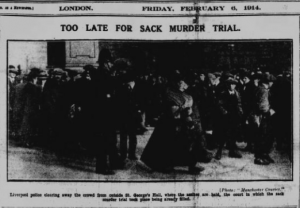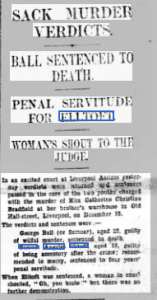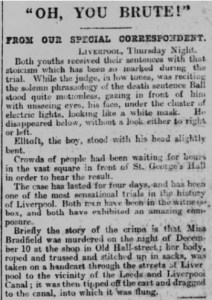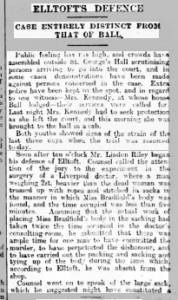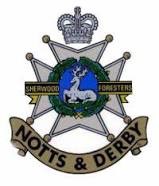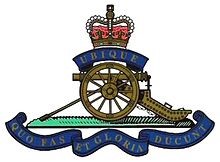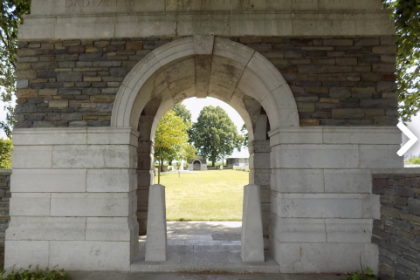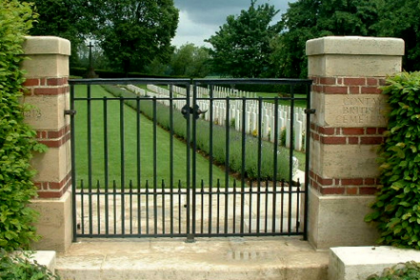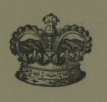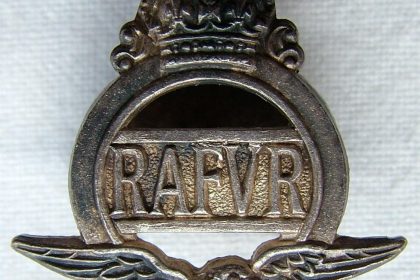In an excited court at Liverpool Assizes yesterday verdicts were returned and sentence passed in the case of the two youth’s charged with
the murder of Miss Catherine Christina Bradfield at her brother’s warehouse in Old Salt Street, Liverpool, on December 10.
The verdict and sentences were:
George Ball (or Sumner), aged 22, guilty of wilful murder, sentenced to death. Samuel Angeles Elltoft, aged 18, guilty of being accessory after the crime; recommended to mercy, sentenced to four years’ penal servitude.
When Elltoft was sentenced, a woman in court shouted, ” Oh, you. brute:” but there was no further demonstration.
“OH, YOU BRUTE!” FROM OUR SPECIAL CORRESPONDENT. Liverpool, Thursday Night.
Both youths received their sentences with that stoicism which has been so marked during the trial While the judge, in low tunas, was reciting the solemn phraseology the death sentence Ball stood quite motionless, gazing in front of him with unseeing eyes, his face, under the cluster of electric lights looking like a white mask. disappeared below, without a look either to right or left.
Elltoft, the boy, stood with his bead slightly bent.
Crowds of people had been waiting for hours in the vast square in front of St. George’s Hall in order to hear the result. The case has lasted for four days and had been one of the most sensational trials in history of Liverpool. Both men have been in the witness box, and both have exhibited an amazing composure.
Briefly the story of the crime is that Miss Bradfield was murdered on the night of December 10 at the shop in Old Hall-street; her body, roped and trussed and stitched up in sacks, was taken on a handcart through the streets. Liverpool to the vicinity of the Leeds and Liverpool Canal ; it was then tipped off the cart and dragged to the canal, into which it was flung.
THE JURY’S RETURN.
The jury, who retired at four o’clock, returned into their box shortly after five o’clock, and the two men were placed side by side in the dock. Amid tense. silence the clerk asked,
“Do you find George Ball guilty?”
The foreman answered, ” Yes.”
“Do you find Samuel Angeles Elltoft guilty” was the next question.
“We find him an accessory after the fact, but. ask for the clemency of the court in view of his youth and in the belief that he was influenced by hall.”
The clerk then turned to Ball and asked. ” Have you anything to say why sentence of death should not be passed upon you?” and Ball replied, in a voice without the slightest trace of emotion, ” Only to say I am innocent.” In reply to the clerk’s query to Elltoft the boy replied, ” I am not guilty of felony or murder.”
The judge, assuming the black cap. said ” George Ball, the jury have found you guilty of the crime with which you were charged, upon evidence which must have brought conviction to the mind of every reasonable being who heard it. It was a cruel and heartless murder.
Your victim had been good to you. she was kind to you, and you murdered her and did away with her body under circumstances which were revolting, but which in your present position I will not dwell upon.
“For your crime, the law knows but one penalty and that penalty is death.
ELLTOFT’S GUILT
” Addressing Elltoft, the judge said: ” You have been found guilty of a very terrible crime, that of assisting a murderer after the murder in concealing his crime. There can be very little doubt that you knew something of the crime, and it was your duty to have made it known.
It was your duty to your employer that you should have made the crime known. But you took an active part in helping the murderer to conceal the crime, and you have been a party to dealing with the body, and you very nearly succeeded by your assistance in concealing altogether this terrible crime which was in fact committed.
“I have taken into account in the sentence I am about to pass the recommendation to mercy of the jury. I have taken into account your youth, and I take into account, what no doubt may be true, that you have been contaminated by the influence of the man who stood by you just now in the dock. But this is a serious offense and must be treated seriously. The sentence of the court is that you be kept, in ‘penal’ servitude for four years.”
As the judge uttered the last words of the sentence, a woman, who was said to be Elltoft’s mother, exclaimed, ” Oh, you brute,” and then broke out into a passion of sobbing. Elltoft received his sentence without any outward sign of emotion. and at a sign from the carder he went quietly below.
ELLTOFT’S DEFENCE – CASE ENTIRELY DISTINCT FROM THAT OF BALL.
Public feeling has run high and crowds have assembled outside at.St George’s Hall scrutinising persons arriving to into the court, and in some cases demonstrations have made coinst persons concerned in the case. Extra police hare been kept on the spot. and in regard to one witness—Mrs. Kennedy, at whose house Ball located—their services seem called for. Last night Mrs. Kennedy had to seek protection as she left the court, and this morning she was brought to the hail in a cab.
Both youths showed signs of the strain of the last three days when the trial was resumed today.
Soon after ten o’clock Mr. Linden Riley began his defence of Elltoft. Counsel called the attention of the jury to the experiment in the surgery of a Liverpool doctor. where a man weighing 2st. heavier than the dead woman was trussed up with ropes and stitched in sacks in the manner in which .Miss Bradfield’s body was found, and the time occupied was less than five minutes.
Assuming that the actual work of placing Miss Bradfield’s body in the sacking had taken twice the time occupied in the doctor’s consulting room, he submitted that there was ample time for one man to have committed the murder, to have perpetrated the dishonour, and to have carried out the packing and sacking and tying up of the body during the time which, according to Elltoft, he was absent from the shop.
BNA copywrite – Daily Citizen (Manchester) – Friday 06 February 1914

